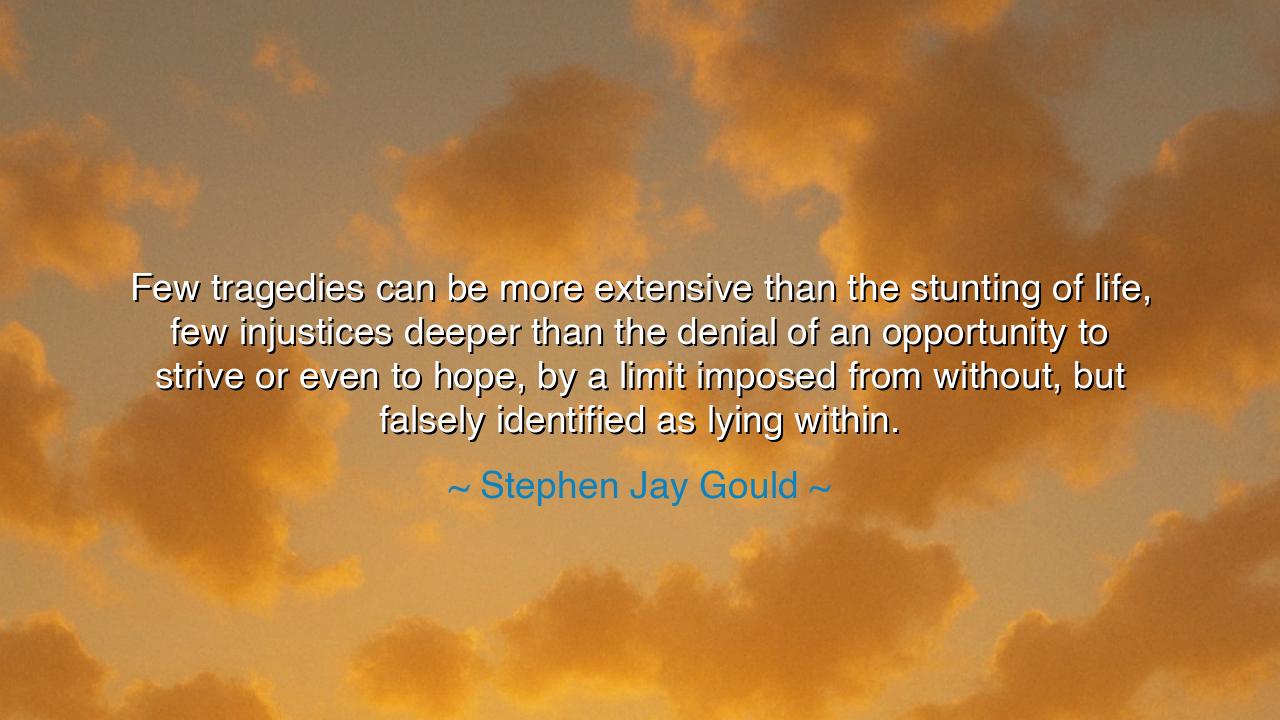
Few tragedies can be more extensive than the stunting of life
Few tragedies can be more extensive than the stunting of life, few injustices deeper than the denial of an opportunity to strive or even to hope, by a limit imposed from without, but falsely identified as lying within.






“Few tragedies can be more extensive than the stunting of life, few injustices deeper than the denial of an opportunity to strive or even to hope, by a limit imposed from without, but falsely identified as lying within.” Thus spoke Stephen Jay Gould, the wise naturalist and philosopher of science, whose mind sought not only to understand evolution, but to defend the dignity of every human spirit. In this profound statement, Gould warns against one of the oldest and cruellest deceptions in the history of humankind: the belief that limits imposed by society are somehow the limits of the soul itself. His words are a cry against the false chains of fate, forged not by nature, but by ignorance and prejudice.
In essence, Gould speaks of the tragedy of stunted life—when a person’s potential is confined, not by their own nature, but by the judgments of others. Such stunting occurs when power declares, “You cannot,” and the individual, taught to believe this lie, replies, “I am not able.” It is the silent death of possibility, the extinguishing of the flame before it has the chance to burn. To deny opportunity, he says, is among the gravest injustices—not merely because it withholds success, but because it crushes the sacred human right to hope. For hope is the oxygen of the soul, and when it is stolen, a person lives in body but dies in spirit.
The limits imposed from without—be they those of race, gender, class, or creed—are among the greatest deceptions in human history. They cloak oppression in the guise of nature. The powerful say, “This group is lesser; this person is incapable,” and thus transform cruelty into law, and injustice into doctrine. But Gould unmasks this falsehood. He reminds us that many barriers we call “natural” are, in truth, man-made illusions—created by those who fear equality, sustained by those who mistake privilege for truth. To believe such limits lie within oneself is to surrender to illusion, to accept the world’s lie as the measure of one’s worth.
The history of humanity is written in the blood and triumph of those who refused to believe those lies. Consider the story of Rosa Parks, who, in one quiet act of defiance, shattered the myth that dignity could be assigned by skin color. The law of her time said that she must yield her seat; society said she was lesser; but within her, the eternal truth of equality burned. In her refusal, she exposed the false limit imposed from without, and revealed that courage and conscience, not color, define the measure of a person. Through her act, an entire people found their hope renewed.
So too, in the realm of thought, Gould himself fought against pseudoscience that claimed intelligence, morality, and destiny were bound by biology. He saw that such ideas—used to justify slavery, oppression, and exclusion—were perversions of science, meant to keep the powerful in comfort and the oppressed in silence. His voice rose like that of a prophet, declaring that humanity’s greatness cannot be graphed or measured, for it lies not in numbers, but in the boundless capacity to strive, to imagine, and to transcend.
The message, then, is both scientific and spiritual: that human potential is infinite when freed from false constraint. Every soul carries within it a seed of greatness, and to deny that seed light is to commit a crime against creation itself. The true test of civilization is not how high its towers rise, but how freely its people can rise within it. When we build walls that tell others “you cannot,” we wound not only them, but the human spirit that unites us all.
Let this be the wisdom we carry forward: never mistake oppression for destiny, nor believe that your limits are written in your nature. The barriers that surround you may have been built by history, but they need not define your future. Strive, even when the world says you cannot. Question, even when knowledge is guarded by gatekeepers. And when you see another’s potential being stifled, speak, for silence is the accomplice of injustice.
In the end, Gould’s words remind us that the greatest tragedy is not failure, but unfulfilled possibility. To live freely—to strive, to hope, to create—is the essence of what it means to be human. Therefore, guard that freedom in yourself and in others. For as long as a single heart refuses to bow to false limits, the human story continues to ascend toward its true, unconquered horizon.






AAdministratorAdministrator
Welcome, honored guests. Please leave a comment, we will respond soon